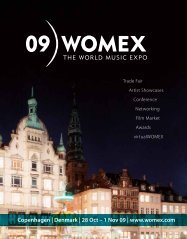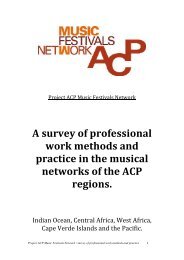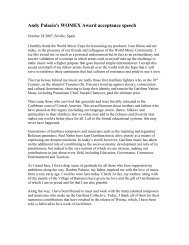WOMEX 11 Guide
WOMEX 11 Guide
WOMEX 11 Guide
You also want an ePaper? Increase the reach of your titles
YUMPU automatically turns print PDFs into web optimized ePapers that Google loves.
Session 9 Session 10 Session <strong>11</strong>Session 12Competition Among Collecting SocietiesHow to evaluate their services and qualityEconomic Impact Studies in theManagement of Arts MarketsA case study of Fira Mediterrània de Manresa(Catalonia/Spain)Blues & RootsThe fertile ground of jazz and world musicCreating a Platform for Diaspora Artistsin the Western MarketThe balance between helping communities and communicatinga sense of belonging, whilst remaining profitableSeSSions CO n f e r e n c eFriday 15:15 – 16:00Conference 1Chaired by Martin Schaefer (Germany),Boehmert & Boehmertwith Frank Dostal (Germany), GEMA;Jakob Hüttel (Denmark), KODAAccording to European law, collecting societies withinEurope are to compete with each other in terms ofservice levels to the authors. This enables authorsbased in Europe to have their rights administered byany European collecting society. Likewise, any usercan choose any collecting society for licensing rightsadministered on a national, regional or Europeanlevel. Previously, users mostly dealt with the societyof the country where the user was based. The panelwill consider the following questions: What makes thedifference? Which rights are available from collectingsocieties in the first place? Does each collecting societyown the same set of rights? What is the differencebetween licensing through a small or a big collectingsociety? Is it difficult to change from one society toanother? These and other questions are to be discussedwith collecting society representatives.› Conference/Publisher MatchmakingFriday 15:15 – 16:00Conference 2Chaired by Jordi Bertran (Spain),Fira Mediterrània de ManresaThe University of Deusto, University Foundation of Bagesand the Tourism Laboratory of Diputació of Barcelonaare the three independent agencies that have chosenFira Mediterrània de Manresa to prepare a study on theeconomic impact of this arts market. Founded in 1998,Fira Mediterrània presents around 250 activities, 145groups and companies, and attracts more than 1,000professionals, over 4 days every year. This paper explainshow music and the arts in general have a multiplyingeffect on the initial investment of governments andsponsors. Through the study, this session examinesthe impact on the cultural sector and the number ofcontracts deriving from the investment. It also quantifiesthe economic impact on the town hosting the fair, aswell as on the surrounding region, with emphasis on thetourist sector, restaurants and bars and general trade.Friday 16:15 – 17:15Conference 2Presented by Europe Jazz NetworkChaired by Gerry Godley (Ireland), Improvised Musicwith Mehmet Ulug (Turkey), Pozitif Productions;Oliver Belopeta (Republic of Macedonia),Skopje Jazz FestivalAll music is folk music, said Louis Armstrong, himself aproduct of the New Orleans melting pot that created jazzat the beginning of the last century. That spirit of creativeexchange between jazz and the global diaspora is as lifeaffirmingas ever, and Balkan, Asian, African, Nordic, Latinand Arabic music are all important accents in today’s jazzsyntax.In this new century, where does jazz sit within the rubricof world music? Is its appetite for collaboration and risktakingcherished and understood, or is it regarded as tooelusive, too difficult in a musical world that must answerto ever more demanding commercial imperatives?How will we respond as a creative community to anew generation of exceptional artists around the worldwhose music easily straddles both jazz and world musicdefinitions.Saturday <strong>11</strong>:00 – <strong>11</strong>:45Conference 1Chaired by Osiel Ibáñez (Chile/Sweden), SelamLatin American migration to Scandinavia goes backsome 40 years and has resulted in a Spanish-speakingdiaspora surpassing seventy thousand inhabitants. Yetuntil recently, the Spanish-speaking communities inSweden and the neighbouring countries had not beentaken into account by the traditional institutions. SELAMis an independent music organisation in Stockholmthat has for 14 years been successfully promoting andintroducing African and Latin music to the Scandinavianmarket and recently began deepening its focus on thevast Latin diaspora and Hispanic culture. Today, Selamhas become the foremost representative within the Latingenres in Sweden, organising tours throughout Swedenand Scandinavia, expanding its cultural network to theAmerican continent, and developing a festival that thissummer attracted thousands of spectators to Stockholm.The producer Osiel Ibáñez will share Selam’s marketingmethods and point out the key elements and strategieswhen creating collaborative opportunities based on thediaspora community.SeSSions CO n f e r e n c e› Network/The World According to Jazz› Conference/Networking Meetings & Presentations:Jazz & World Networking Meeting132133







